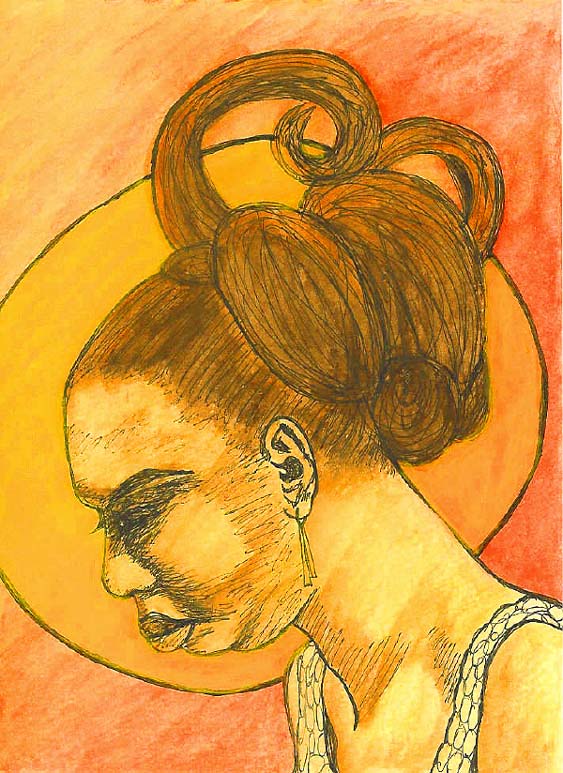Nina Simone: A Heart Above
by rebecca ~ January 30th, 2006. Filed under: Do the right thing.
A small painting by me of St. Nina Simone, The High Priestess of Song
(February 21, 1933 – April 21, 2003)
Pianist, Composer, Performer, Arranger, Singer
Nina Simone’s voice is inseparable from my growth as a human being. In my days as child, listening again and again to the haunting rendition of House of the Rising Sun, I crouched face-to face with our very basic record player and watched the album wavering and bobbing in lopsided circles. Although I didn’t comprehend the significance of that House until I was a teenager, I knew the sadness of the character’s fate, and identified with it.
In my teenage years, I discovered more of her songs to love, singing along in my bedroom to a cassette tape with Sinnerman, Don’t Let Me Be Misunderstood (a critical song to have at such an age), Mississippi Goddamn, Strange Fruit (much sadder and dramatic than Billie’s), Nobody Loves You When You’re Down and Out, and Kurt Weill’s Pirate Jenny. And, of course, her version of one of my most favorite songs of all conceptual time, I Put a Spell on You (also done by the incomparable Screamin’ Jay Hawkins), expresses so much what a lovely mess love is.
In the past months since we got a new used car with a multiple disk CD player, I have been listening to her sing as I drive to and from work: over and over I hear Save Me, Ooo Child Things Are Gonna Get Easier, and Talkin’ about a Revolution.
Whenever I’ve introduced her music to friends over the years, many imagine at first listen that she is a man, with a man’s voice, and–more than the timber of her voice–I think she carries inside her songs a power and a defiance not normally anticipated in a woman singer (or a woman), and thus, due to her formidable presence, her words resonate stronger than most singers, male or female. She didn’t hide her power, ever.
She has for me the deepest, most somber voice of the human heart–a voice of pain, righteous rage, and wacky humor all rolled into a weighty punch that demands the ears to sit down, be still, and listen. R-E-S-P-E-C-T, indeed. She was unafraid to shout for justice in the Civil Rights era and beyond, she resolutely refused to be typecast, and she remains a soul alive in song. We truly need more of her strength in this world.
She left America in 1971 and lived in Europe and, finally, France for the rest of her life. She couldn’t stand the omnipresence of racism in the States. She would have been the first woman classical pianist of African American origin (she had to drop out of Julliard to support her family when her benefactor stopped support) had it not been for the prejudice and blindness that still afflicts so many in the USA. Rather than ‘cure’ these people, she said, ‘the hell with ’em” instead and made her own way. I respect her for this decision to be herself, to see herself only as an indefinable, unique artist.
An excellent article (with a moving blog posting in the side-bar by another writer) about her continued impact on modern songwriters can be found here.
A good website on her bio and work is here. It looks like a musical tribute for her is traveling around Europe, too. Wish I could see it.
She is quoted as saying: “Through my life I made a world for myself…and the best thing of all is that I’m still happy to live in it, after all these years.”
I want to keep feeling this way about mine. Her words give us the strength needed to live a life less ordinary.